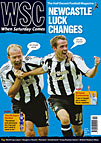 Romário may be greying but he’ll still score you plenty of goals – provided you don’t ask him to travel or do too much of that training nonsense, explains Robert Shaw
Romário may be greying but he’ll still score you plenty of goals – provided you don’t ask him to travel or do too much of that training nonsense, explains Robert Shaw
Romário da Souza Faria celebrates his 40th birthday on January 29 still mad about goals. His critics might add that he is equally passionate about bars, nightclubs, the beach, bad-mouthing fellow strikers and developing minor knocks on the eve of away trips. But when he claimed his award as the Brazilian national championship’s top scorer in December 2005, Baixinho (Shorty) was speechless. Or rather he told the presenters of the ceremony in Rio’s João Caetano theatre that he did not really need to add any words to back up his impressive goal tally.
Romário’s haul of 22 goals played a big part in keeping Vasco da Gama afloat in the top division, the team having haemorrhaged 110 goals over the 42-game April-to-December championship. A little over a year ago, however, many observers were urging his retirement after his acrimonious departure from another of the big Rio clubs, Fluminense, whom he had joined from Vasco in 2002.
Romário’s star status had grated among some at Fluminense, notably because he received his salary directly from sponsor Unimed while team-mates had to wait three months for wages. The final straw came when Romário fell out with coach Alexandre Gama, whose inexperience he mocked by claiming “he has only just got on the bus but already wants the window seat”. In fact, injury and an aversion to travel meant that Romário contributed little, especially after he and his personal aide attacked a disgruntled fan who had released chickens among Fluminense players at one of Romário’s rare training-ground appearances.
This season’s goal haul at Vasco, mostly comprising his usual repertoire of penalties, tap-ins and toe-pokes, looks even better when the absences are taken into account. He opted out of many away games, especially in the first two-thirds of the season – one of a special package of privileges that received the blessing of controversial club president Eurico Miranda. Among the others were exemption from much of Vasco’s concentracão period in the lead-up to games and a green light for “distance training”, allowing beach-bound Romário to follow his own personalised fitness programme away from the club.
Journalist Juca Kfouri, who rates him as an all-time Brazilian great, argues that the regalias (privileges) are part of the package: “Either you allow him them or he doesn’t play for you. The best team for him now is the one that gives him the most leeway.”
Even with relegation looming and Romário undermining coach Dario Lourenço by handing out the bibs at training, Vasco’s president Miranda excluded his star from blame for the team’s predicament; Romário was also allowed to speak to the media while team-mates and club officials were gagged by presidential edict. Romário’s influence was underlined when Lourenço was sacked and replaced by an old friend and fellow bohemian, Renato Gaucho.
The latter had been excluded from Tele Santana’s 1986 World Cup squad after being caught breaking a curfew, so could be expected to identify with his celebrated striker, who in 2001 incurred the wrath of national coach Luiz Felipe Scolari by inviting an air hostess into the team’s training camp. This solidarity also expressed itself when Renato emphasised that his Vasco team would be “Romário and ten others”.
President Miranda had previously honoured Romário by retiring the number 11 shirt after his move to Fluminense three years ago. Romário was also said to have allowed Vasco to reschedule their debts with him from an earlier spell at the club between 1999 and 2001, when he is famously believed to have paid wages and lent money to cash-strapped team-mates.
However, despite his recent claim that “it was with Vasco that I have had the best moments of my club career”, few vascainos idolise Romário in they way they do Roberto Dinamite, Brazil’s 1978 World Cup striker who spent most of his career at the club, or Edmundo, whose 29 goals helped Vasco to a national championship success and Copa Libertadores title in 1997.
Instead, Romário is more closely associated with Flamengo, with whom he spent five largely unfulfilling seasons on his return home from Barcelona in 1994. This mixed reaction to Romário almost produced a tragedy in 2000, when the national championship play-off final between Vasco and São Januario had to be abandoned after a fence collapsed during a crowd surge, the cause of which was a heated row about Baixinho between two groups of Vasco fans.
When Carlos Alberto Parreira compiles his World Cup squad for Germany this summer, the striker who saved his job as coach first time around with a brace against Uruguay in the Maracanã in 1993 will not appear. Romário’s farewell international came in a specially arranged friendly last April, where he scored in a win over Guatemala.
According to Romário’s own arithmetic, he needs around 50 more goals to take him past a career total of 1,000, surpassed in Brazil only by Pelé. But, given his greater enthusiasm for peladas – kickarounds – than official games, it is no surprise that futvolei and Brazil’s beach team have already caught his eye.
From WSC 228 February 2006. What was happening this month